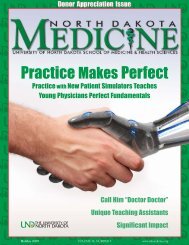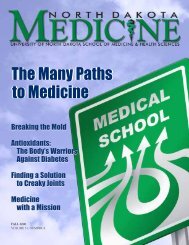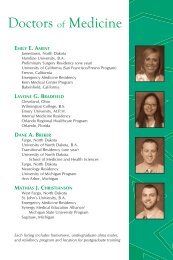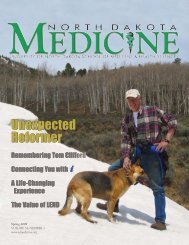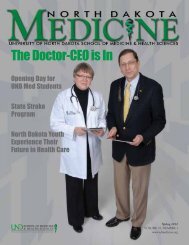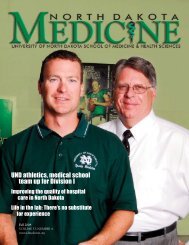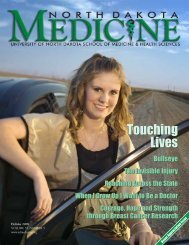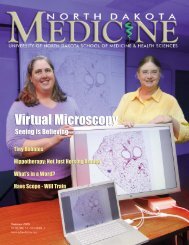View PDF - North Dakota Medicine
View PDF - North Dakota Medicine
View PDF - North Dakota Medicine
- No tags were found...
Create successful ePaper yourself
Turn your PDF publications into a flip-book with our unique Google optimized e-Paper software.
Fiscal Year 2012<br />
Sponsored Project<br />
Awards by Sponsor Type<br />
$3.5 million—HRSA funds Center for<br />
Rural Health’s Center of Excellence in<br />
Native Behavioral Health<br />
The federal Health Resources and Services<br />
Administration’s Bureau of Health<br />
Professions awarded the SMHS a five-year,<br />
$3.5 million grant to be a Center of<br />
Excellence in Native Behavioral Health.<br />
The name of the new Seven Generations<br />
Center of Excellence in Native Behavioral<br />
Health is based on the Great Law of the<br />
Iroquois Confederacy, which states “In<br />
our every deliberation, we must consider<br />
the impact of our decisions on the next<br />
seven generations.”<br />
The purpose of the Seven Generations<br />
Center is to recruit, mentor, and retain<br />
promising American Indian, Alaskan<br />
Native, and Native Hawaiian students<br />
who have an interest in becoming mental<br />
health professionals.<br />
“The new center will serve to plug the<br />
leaks in the workforce pipeline,” said Jacque<br />
Gray, PhD, research associate professor in<br />
the Center for Rural Health, who will<br />
direct and be the principal investigator for<br />
the Seven Generations Center.<br />
The Seven Generations Center—one<br />
of three Native American centers housed<br />
at the Center for Rural Health’s<br />
Indigenous Programs Section—will forge<br />
new partnerships to support Native<br />
American students.<br />
$2.64 million—U.S. Office of Rural Health<br />
Policy funds UND Center for Rural Health<br />
The Center for Rural Health at the SMHS<br />
was designated as one of seven national<br />
rural health research centers by the federal<br />
Office of Rural Health Policy. UND was<br />
awarded a four-year, $2.64 million grant to<br />
operate the Rural Health Reform Policy<br />
Research Center (RHRPRC). The purpose<br />
of the research center is to conduct at least<br />
16 policy-relevant research studies and<br />
policy analyses that are relevant<br />
specifically to rural health, especially how<br />
health care reform as it currently is<br />
mandated or changes will influence rural<br />
health care access and delivery.<br />
$1.65 million—U.S. grant funds cancer<br />
monitoring service<br />
The SMHS, in collaboration with the<br />
<strong>North</strong> <strong>Dakota</strong> Department of Health, was<br />
awarded a five-year, $1.65 million grant<br />
from the Centers for Disease Control and<br />
Prevention to operate the <strong>North</strong> <strong>Dakota</strong><br />
Statewide Cancer Registry. UND experts in<br />
the Department of Pathology and the<br />
Center for Rural Health will supervise the<br />
registry, which will serve to provide a<br />
cancer early warning system for the state.<br />
The purpose of the <strong>North</strong> <strong>Dakota</strong><br />
registry, established in 1997, is to monitor<br />
cancer trends, promote research, increase<br />
survival, guide policy planning, and<br />
respond to cancer concerns from patients<br />
or the public.<br />
“UND will collect and organize the<br />
data so it can be used for public health<br />
monitoring as well as research studies,”<br />
said Mary Ann Sens, MD, PhD, professor<br />
and chair of UND’s Department of<br />
Pathology, who will serve as the program<br />
director. “Additional goals of the registry<br />
are to establish that cancer treatment in<br />
<strong>North</strong> <strong>Dakota</strong> is equitable, prompt, and<br />
meets national standards.”<br />
$1.4 million—NIH funds research into<br />
Alzheimer’s–obesity links<br />
This year, Colin Combs, PhD, and Mikhail<br />
Golovko, PhD, faculty members in the<br />
SMHS Department of Pharmacology,<br />
Physiology, and Therapeutics, received<br />
NIH funding totaling $1.4 million to<br />
determine the relationship between<br />
Alzheimer’s disease and obesity.<br />
Combs and Golovko’s targets of<br />
interest are molecules of APP (amyloid<br />
precursor protein), proteins that are<br />
responsible for the flow of materials into<br />
and out of not only adipose (fat) cells but<br />
brain cells as well. APP is a freighthandling<br />
molecule that serves to transport<br />
substances through the cell membrane.<br />
Combs and Golovko have been able to<br />
demonstrate that a high-fat diet in mice<br />
stimulates an increase in APP, and higher<br />
levels of APP in the brain correlate with<br />
increased evidence of cell damage and<br />
inflammation, both of which are consistent<br />
to some degree with what is observed<br />
during Alzheimer’s disease.<br />
Combs and Golovko’s grant brings to<br />
$6.85 million the total funding awarded by<br />
the NIH to SMHS researchers this year in<br />
the Department of Pharmacology,<br />
Physiology and Therapeutics.<br />
16 NORTH DAKOTA MEDICINE Holiday 2012



